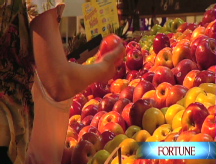Raw deal: Buying green
Some eco-friendly goods may be better for the planet, but not so great for your bottom line. So pay attention to which ones you're springing for.
NEW YORK (CNNMoney.com) -- Would you pay over $5 for all-natural cleaner made with eucalyptus essence? How about a 20% premium for paper towels made from 100% unbleached recycled paper? Shoppers are often asked to pay more for environmentally friendly goods, but they might want to think twice before shelling out.
Yes, going green can sometimes be better for the environment or even better for your health, but green goods also cost more - a lot more. In order to comply with the Department of Agriculture's standards for certification, producers need to use ecologically sustainable practices and materials, and that usually doesn't come cheap.
When consumers compare environmentally-friendly products to their conventional counterparts, always choosing the former can get really expensive, says Lisa Freeman, editor in chief of ShopSmart magazine.
That's a tough decision to make for a lot of cash-strapped shoppers, who are struggling to make ends meet and looking for ways to save at the grocery store. "In this economy, you have to prioritize," Freeman said.
Freeman says buying organic produce is one area where it is worth the hefty price premium. Although it can cost up to 100% more in the store, organic food is grown without antibiotics, pesticides or chemical fertilizers and is not only better for the environment, but also safer and more nutritious.
For the same reason, organic baby food is certainly worth the extra dough. Not only are infants more vulnerable to the health risks that chemicals can cause, but the toxins are also more potent. "When you are condensing fruits, the pesticides become even more concentrated," Freeman explained.
But there are exceptions. While pesticide residue can pose a threat to your health when ingested through fruits and vegetables that you eat whole or with the skin on, like strawberries and peaches, it is less of a problem on produce with hard coverings like bananas, watermelon and avocados. So that's one area where consumers can save substantially.
For example, the conventional bananas sold at Whole Foods (WFMI, Fortune 500) cost $.69 per pound, that's a lot less than the organic alternative, which weigh in at $.99 per pound - an added cost of more than 40%. Online grocer FreshDirect offers mass-market avocados for a third less than the organic ones - a savings you can really sink your teeth into.
Shoppers should splurge instead on USDA-certified organic meat, poultry and dairy products - free of antibiotics and toxins found in the conventional variety.
But be wary of the "grass-fed" label, Freeman warns. Retailers often tack on a high-price to meat with that distinction, but "all it means that cows may have spent some time in a pasture," said Freeman. It does not mean that they were exclusively grass fed.
When it comes to cleaners, going green is important. Conventional cleaning supplies with harsh chemicals can aggravate respiratory conditions like asthma, and are often made from nonrenewable resources like petroleum and phosphates, which can damage the ecosystem when they are released in the waterways.
It may make more sense to skimp on other household products like paper towels and toilet paper since these products don't have a direct impact on your health. But the recycled paper still offers an environmental benefit, so if that's important to you, spring for the greener brands. Fortunately, price premiums have been shrinking in this area.
John Murphy, VP of sales at Seventh Generation, a maker of environmentally-friendly household products, says the company would like to see lower margins on green goods across the board but that premium is driven primarily be the retailers, who take a higher margin on eco-friendly brands.
Murphy also points out that part of the higher cost is because Seventh Generation commits 10 percent of their profits to support nonprofit organizations nationally.
"That is a cost of doing business in a socially responsible setting," he said.
But if you really want to save money and be socially responsible, then go with the greenest do-it-yourself cleansers that are also the cheapest - baking soda, lemon juice, vinegar and salt can tackle everything from coated on grease to soap scum.
Chances are they are already in your kitchen, and that means you'll save money while you do your part to save the planet. ![]()


